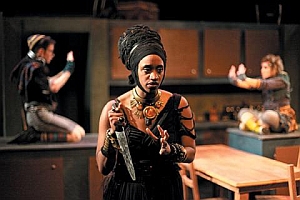Sideshow Theatre's Medea With Child: Adaptation Isn't The Best Form Of Flattery
By Julienne Bilker in Arts & Entertainment on Apr 13, 2010 9:00PM

photo of Andrew Sa, Sojourner Zenobia Wright and Lea Pascal by Ian Epstein
In her program note, playwright Janet Burroway sheds a bit of light on the answer. Among other things, the Medea myth communicates to her that we (in the general sense) "foist our fears on whoever seems 'foreign' to us," and "that we mean to change but don't." We had trouble seeing the latter concept as anything more substantial than a tacked-on theme, but our bigger problem was with the former. Although it makes sense to re-envision Medea's outsider feelings in a more literal way - ie, turning her into the aforementioned voodoo woman - this show places an excessive, mildly offensive emphasis on her other-worldliness as the catalyst for her actions. There is some discussion of Media as a leader of the feminist movement (which one, we're not sure), but she is seen as more foreign than woman, therefore justifiably dismissible. "They say Media is just noise," one character remarks. The argument we gleaned from observing this tack is, firstly: that Chasten (this adaptation's Jason) cheated on her because her weirdness had become too much for him to take, not because he's a jackass, so it's kind of okay (which is not okay with us) - and secondly: that Media's real problem was her sense of alienation from the world-at-large, rather than her husband (which is logical, but feels a bit weak).
Burroway also adds that her adaptation is a comedy. While comedic elements have been layered into the script - for example, Crayon (that would be King Creon), has a few game show-esque bits in which he tries to present alternate outcomes for the play, such as, for example, nobody dying - they feel forced, gimmicky and out of place, particularly given Media's very obvious absence of humor. Combine that with an overall lack of clear tone, and the result is a strange conglomeration of mismatched moments that don't add up to a cohesive story. A few other less-than-ideal choices cause distracting logistical problems as well - Media's accent is often hard to understand as the theater's echo is significant, her children inexplicably speak in Cockney dialect, and the impact of a few key scenes is diminished when actors upstage themselves. It feels as though director (and Sideshow Artistic Director) Jonathan L. Green composed each scene by itself in rehearsal and never watched a run-through.
That being said, there are some positive merits to this production. As Media, Sojourner Zenobia Wright is a powerful, moving presence with a rich voice - and despite script-supported efforts to obfuscate any familiarity, relatable. Lea Pascal and Andrew Sa (Media's teenage children, Murmurous and Fairies) are entertaining and clearly committed to mining as much as possible from their roles. We'd be interested to see a play based on them, Rosencrantz and Guildenstern Are Dead-style. There is some excellent work from scenic designer Joshua Lansing, whose cabinetry allows both people and props to make whimsical entrances. We also loved Media's costume (designed by David Hyman), a fragmented black dress adorned with horse hair (we think) hanging from her side and accented with large metallic jewelry.
Sideshow Theatre was one of just two Chicago theatre companies to win a Chase Community Giving grant earlier this year - so, despite our assessment of this production, we were disheartened to be in an audience of less than fifteen. We chalked up the diminutive crowd to the fact that the venue (La Costa Theatre) is an off-the-beaten-track house whose poorly-marked entrance is shared with an auto repair shop. Here's the thing though: La Costa Theatre also shares an entrance with New Rock Theater, which is currently hosting Point Break Live! On our way out, the line for the late-night performance of that show was down the stairs and out the door. Sure, it's a more crowd-pleasing genre, but still: ouch.
Medea With Child, through April 25. Sideshow Theatre Company at La Costa Theatre, 3931 N Elston Ave. Tickets $15.